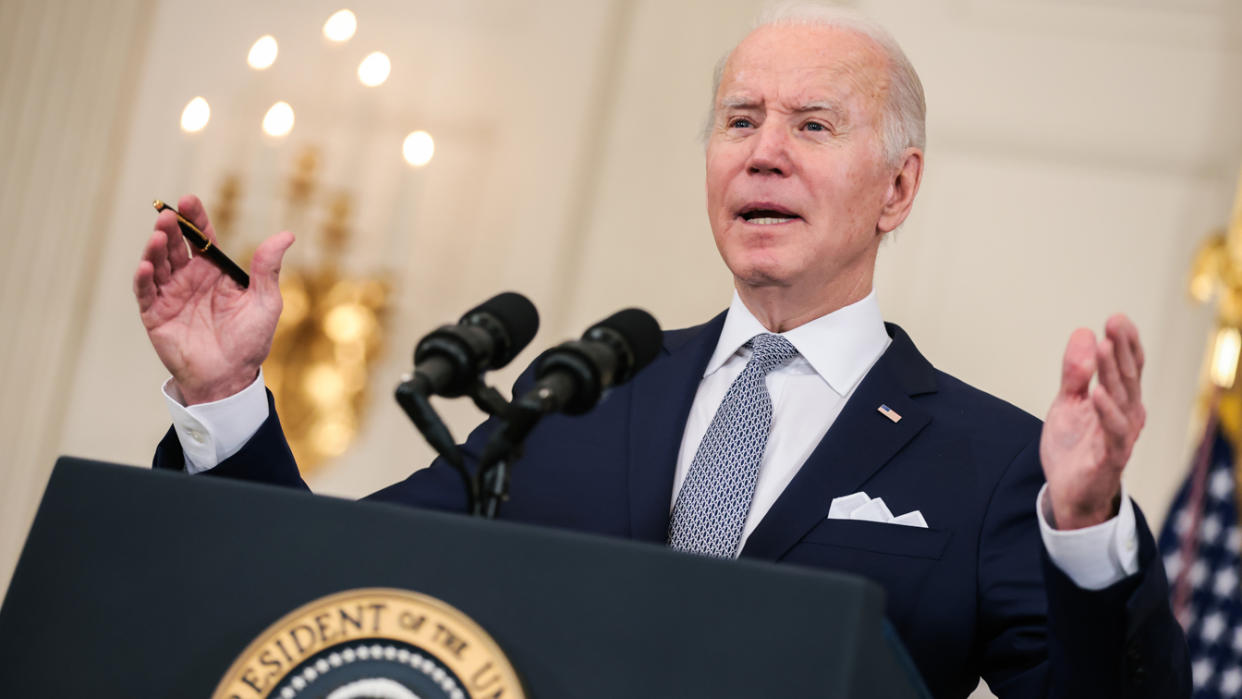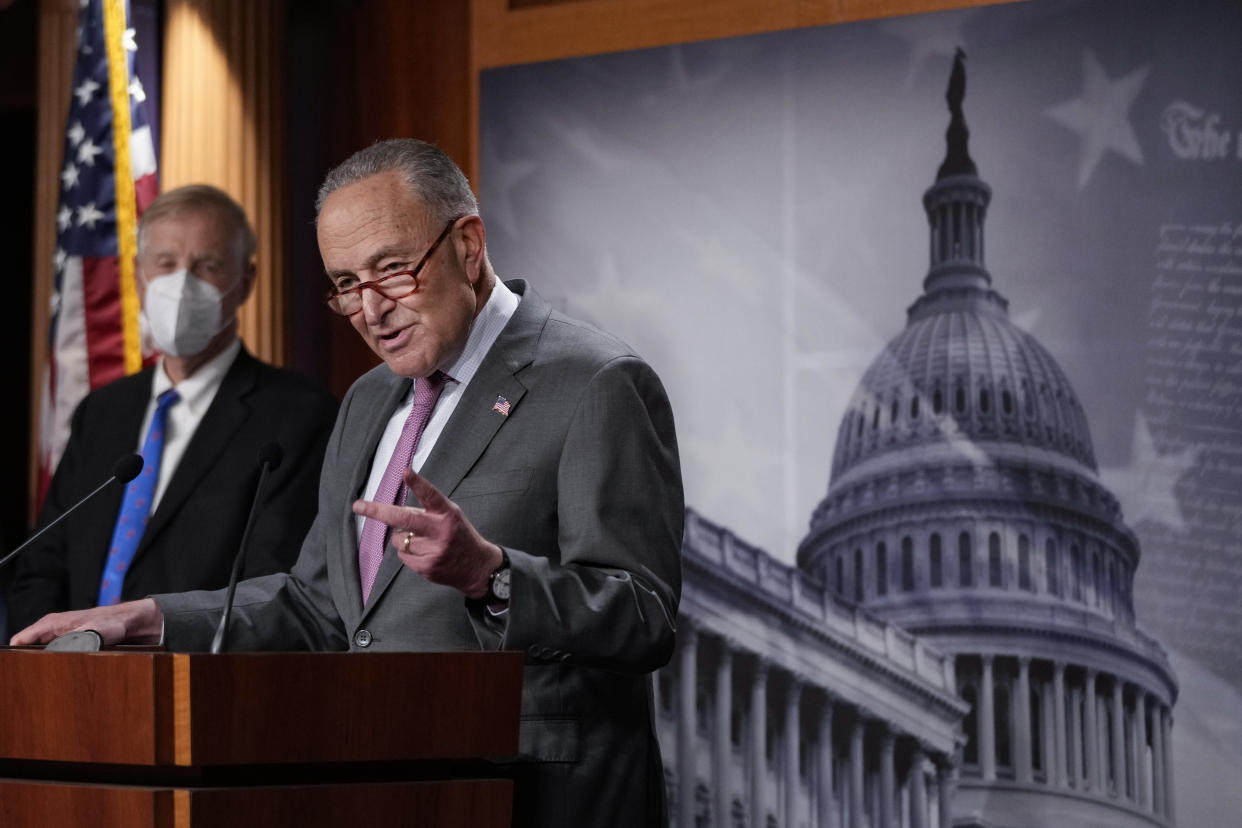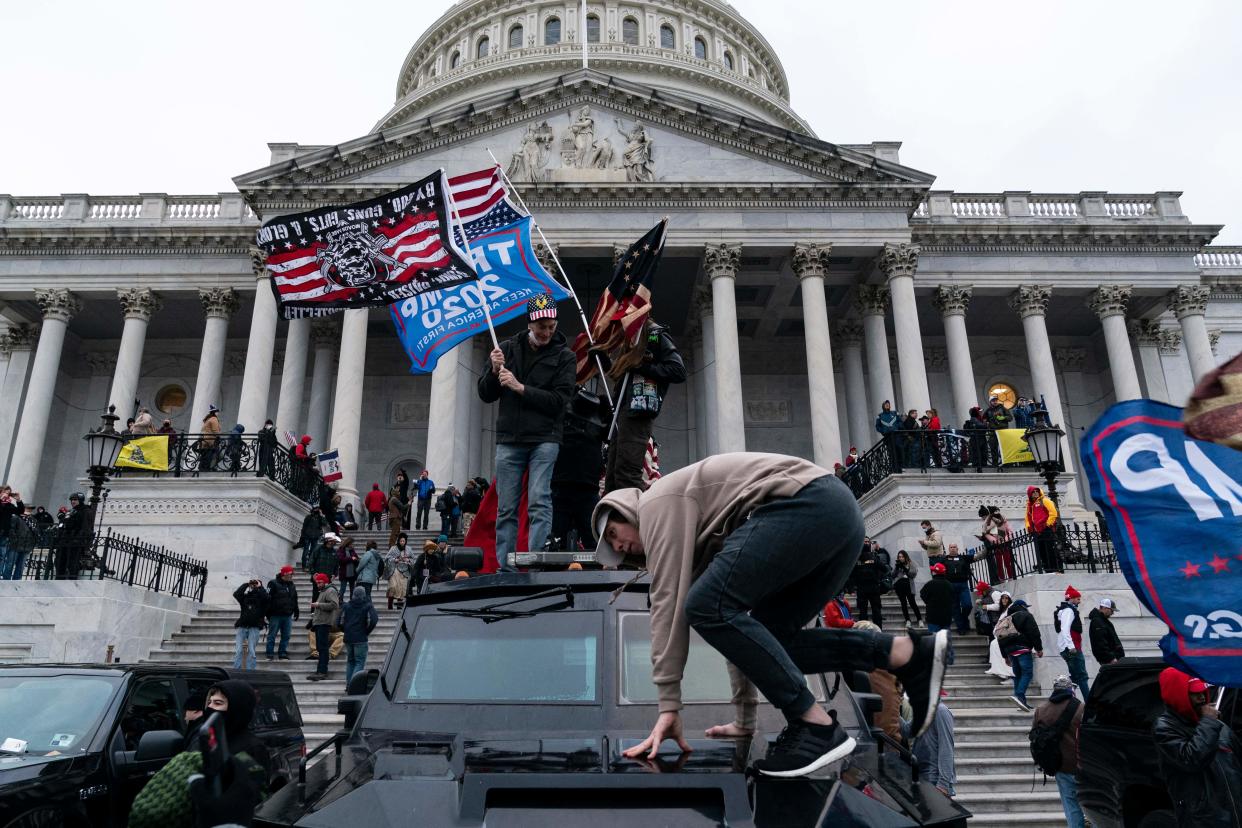Biden calls for change to Senate filibuster to pass voting rights bills, but not all Democrats on board
President Biden formally endorsed a change to Senate rules that would ease the passage of new voting rights legislation, but work remains to convince every Democratic senator to support the plan.
“The next few days, when these bills come to a vote, will mark a turning point in this nation,” Biden said, speaking in Georgia on Tuesday, referring to a pair of proposals expected to reach the Senate floor in the next week.

“Will we choose democracy over autocracy, light over shadow, justice over injustice? I know where I stand. I will not yield. I will not flinch. I will defend your right to vote and our democracy against all enemies foreign and, yes, domestic. The question is where will the institution of the United States Senate stand?”
Visiting Atlanta with Vice President Kamala Harris, Biden stressed many of the same points about democracy being under attack that he made last week in a speech marking the anniversary of the Jan. 6 Capitol siege.
“Sadly, the United States Senate, designed to be the world’s greatest deliberative body, has been rendered a shell of its former self,” he said.
“It gives me no satisfaction in saying that, as an institutionalist, as a man who was honored to serve in the Senate, but as an institutionalist I believe the threat to our democracy is so grave that we must find a way to pass these voting rights bills. Debate them, vote, let the majority prevail and if that bare minimum is blocked, we have no option but to change the Senate rules including getting rid of the filibuster for this.”
“Anti-voter laws are not new in our nation, but we must not be deceived into thinking they are normal,” Harris said, speaking before Biden, adding, “The proponents of these laws are not only putting in place obstacles to the ballot box, they are also working to interfere in our elections to get the outcomes they want and discredit those that they don’t. That is not how a democracy should work.”
Senate Majority Leader Chuck Schumer has set Jan. 17 — Martin Luther King Jr. Day — as his deadline for votes on legislation tied to voting rights. The first, the Freedom to Vote Act, would limit state efforts to restrict voting, combat gerrymandering and protect election officials. The second, the John Lewis Voting Rights Advancement Act, would restore antidiscrimination elements stripped from the Voting Rights Act via a 2013 Supreme Court ruling.
Both bills, however, are seen as unlikely to pass unless changes are made to the filibuster, which is a legislative procedure that prevents most major pieces of legislation from passage without a 60-vote supermajority. Democrats and Republicans each control 50 seats in the chamber, meaning that both bills are all but dead on arrival unless the Senate agrees to a “carve-out” for voting rights legislation — which Biden endorsed Tuesday.

Critics of the Senate filibuster note that it is not mentioned in the Constitution and has been historically used to stifle legislation related to civil rights. The 60-vote threshold has been used to kill a wider variety of bills in recent years, including the Manchin-Toomey plan to require universal background checks on gun sales in the wake of the Sandy Hook shooting. That measure failed to advance in April 2013 despite 54 senators voting in favor.
Recently, both parties have changed the number of necessary votes for nominations from the White House, which previously sat at 60. In 2013, Senate Democrats reduced the votes necessary to confirm judges and executive branch appointees — except for Supreme Court justices — to a simple majority. In 2017, Republicans removed that exception, allowing nominees to the nation’s highest court to also be confirmed with 51 votes.
“We must ask ourselves,” Schumer wrote in a Jan. 3 letter to fellow Democrats, “if the right to vote is the cornerstone of our democracy, then how can we in good conscience allow for a situation in which the Republican Party can debate and pass voter suppression laws at the state level with only a simple majority vote, but not allow the United States Senate to do the same?”
The proposal that Biden and Schumer are supporting would not abolish the filibuster entirely but create an exception for voting rights. But all 50 senators who caucus with the Democratic Party would need to agree on passing that change to the filibuster, a path that seems unlikely at the moment.
“We need some good rule changes to make the place work better, but getting rid of the filibuster doesn’t make it work better,” Sen. Joe Manchin, D-W.Va., said Tuesday morning. An attempt last summer by Manchin to garner bipartisan support for a voting rights bill was quickly rebuffed by his Republican colleagues.

It is not just Manchin, the most conservative Democrat in the chamber, who appears opposed to changing the filibuster. Sen. Mark Kelly, D-Ariz., who is up for reelection this fall, told Politico he was undecided on the change. Sens. Jon Tester, D-Mont., and Jeanne Shaheen, D-N.H., are among the others who have not committed to the carve-out. Senate Minority Leader Mitch McConnell has accused Democrats of attempting to “break the Senate” and nationalize elections.
“This is one of those defining moments,” Biden told reporters Tuesday morning. “People are going to be judged, where were they before and where were they after the vote. History is going to judge this. And so the risk is making sure people understand just how important this is.”
The 2022 midterms and 2024 presidential race are set to occur as millions of Americans say they believe former President Donald Trump won the last election. A Yahoo News/YouGov poll released last week found that a vast majority of Trump voters (75 percent) falsely believe the election was “rigged and stolen,” while just 9 percent of them think Biden “won fair and square” — down from 13 percent last January.
Republican politicians have begun catering to those beliefs in order to win their primaries, leading to the passage of bills restricting voting in 19 states and candidates running explicitly on the message that they wouldn’t have certified the 2020 results and baselessly stating the election was stolen. Many of the pro-conspiracy candidates are running for offices where they would directly oversee elections.
Prominent GOP figures who stray from this view are targeted by Trump, such as Sen. Mike Rounds of South Dakota, who was attacked after stating the election wasn’t stolen in a Sunday interview, and Rep. Liz Cheney of Wyoming, who has become a top primary target for her continued pushback against 2020 election conspiracies and investigation into the events of Jan. 6.

Georgia, which narrowly voted for Biden in 2020, has been one of the central battlegrounds for voting rights. In March 2021, Republican Gov. Brian Kemp signed a bill passed by Georgia’s Republican-controlled legislature that limited voting while also transferring powers away from the secretary of state and instead giving them to a State Election Board controlled by the same partisan legislature. Under the law, the board can also suspend local election officials with whom it disagrees.
Kemp, a conservative Republican who certified Biden’s victory in the state, is currently facing a primary challenge from former Sen. David Perdue, who has been endorsed by Trump. Perdue says he would not have certified Biden’s victory.
During the Tuesday trip, Biden visited the crypt of the Rev. Martin Luther King Jr. and his wife as well as the historic Ebenezer Baptist Church. Sen. Raphael Warnock, D-Ga., who is up for reelection in the fall and is a senior pastor at the church, has been a leading advocate for making a carve-out for voting rights. When asked outside the church what he would say to activists who are disappointed in him and whether he has the necessary votes, the president replied, “Keep the faith.”
Those involved in the push for voting rights have been urging Biden to call for an end to the filibuster since he took office. Last July, Biden gave a speech in Philadelphia on the topic, where he called Republican bills restricting voting rights and conspiracy theories about the 2020 election results “the most significant test to our democracy since the Civil War” and urged Congress to take action in passing federal protections.
Biden did not, however, call for an end to the filibuster at that time, instead touting his ability to work with Republicans as the Senate worked on a bipartisan infrastructure bill.
“I said to him I thought it was a good speech,” said the Rev. Al Sharpton, who was acknowledged by Biden at the beginning of the July 2021 speech. “I was very happy to hear him bring up race. But we’re still waiting on the filibuster. He told me, ‘We’re still working on our position on that.’ He was noncommittal.”

Some voting rights activists skipped Biden’s event in Georgia, including Democratic gubernatorial candidate Stacey Abrams, who posted in support of the event on Twitter but whose staff cited a scheduling conflict.
“I spoke with Stacey this morning,” Biden said Tuesday when asked about her absence. “We have a great relationship. We got our scheduling mixed up ... I talked with her at length this morning. We’re all on the same page and everything is fine.”
Others were more blunt in their explanations.
“We do not need any more speeches, we don’t need any more platitudes,” James Woodall, former president of the NAACP of Georgia, told the New York Times. “We don’t need any more photo ops. We need action, and that actually is in the form of the John Lewis Voting Rights Act, as well as the Freedom to Vote Act — and we need that immediately.”
Former President Barack Obama put his support behind the abolition of the filibuster in July 2020. Eulogizing civil rights leader Rep. John Lewis, Obama listed a series of suggestions for improving voter participation, including expanding early voting, making Election Day a national holiday and ending partisan gerrymandering.
“And if all this takes eliminating the filibuster — another Jim Crow relic — in order to secure the God-given rights of every American, then that’s what we should do,” Obama said.


